


Are you struggling with one or more absent teeth? You aren’t the only one. Roughly 178 million people have lost at least one tooth, whereas 40 million are missing all of their pearly whites. While this issue may be common, it doesn’t mean you have to settle for living with gaps in your smile for the rest of your life. Our team at Green Hills Dental Center can effectively restore missing teeth with custom-designed dentures in Nashville. With this treatment, you’ll be able to enjoy eating more comfortably while also showing off a beautiful new smile. Read along or reach out to our office today to learn more about this popular restoration treatment!

If you’re missing one, several, or all of your teeth, then you’re likely a good candidate for dentures in Green Hills. By renewing your smile with these restorations, you won’t have as much difficulty with daily oral tasks like talking, eating, and grinning. Since there are multiple options available to address missing pearly whites, you’ll need to schedule a consultation with our dental team so that we can help determine the proper treatment for you. We’ll check for the number of teeth needing replacements, where they’re located, and address any developing issues we may detect, like decay and gum disease, before proceeding.

According to the American College of Prosthodontists, some of the most common causes of tooth loss involve decay, gum disease, physical trauma, and poor oral hygiene. Certain systemic health conditions can also increase the risk of missing multiple teeth. For these reasons, it’s essential to know the root of your situation and why you’ll need to restore the gap sooner rather than later.
Other than having difficulty eating and talking, having missing teeth can have several negative impacts on your smile and overall health. Firstly, your remaining pearly whites can start to shift out of place to fill in the gap. You’ll also have a higher risk of experiencing gum recession, jawbone deterioration, facial sagging, and reduced self-esteem.
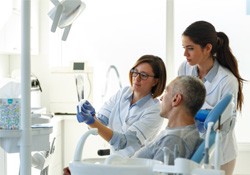
Generally, most people who are struggling with tooth loss may be eligible for dentures. This tooth-replacement option is also designed for patients who are experiencing decayed or sensitive teeth. For your treatment to work, you’ll need to have healthy and sufficient gum tissue and jawbone structure to support your restorations.
The number of teeth that you’re missing will also influence the kind of dentures you’ll likely receive. Depending on your case, you’ll be able to choose from partial, full, or even implant dentures. This treatment is usually more affordable than other solutions, so it can be ideal for those who are on a budget.

Even if you aren’t eligible for dentures in Green Hills, you might explore alternative treatment options, including:
Learn More About Dental Bridges Learn More About Dental Implants

We offer a variety of dentures that can address specific dental needs. During your visit with us, we can walk you through the following options and determine which is best for you.
If you have gaps in your smile along with strong and healthy remaining teeth, then partial dentures might be an ideal choice for you. These restorations are designed to secure onto surrounding pearly whites with discreet clasps or brackets like a puzzle piece. This will allow multiple teeth in various locations of your mouth to be rebuilt with a single dental restoration.
Traditional dentures are meant to replace an entire row of missing teeth on the upper, lower, or both arches. Instead of using clasps, these restorations rely mostly on the natural shape and suction of the mouth to remain firmly in place. They’re also crafted to fit your exact bite, so you can expect them to look and feel like your permanent teeth.
Unlike traditional ones, implant dentures are fitted atop dental implants, directly anchoring your new smile to your jawbone. Not only does this prevent accidental slippage, clicking, and the need for adhesives, but it can also prevent facial sagging and further tooth loss. You can also expect to enjoy about 80% or more of your natural biting power, meaning you can enjoy all your favorite foods. Your restorations will be designed to last many years, so you won’t have to worry about needing frequent adjustments or replacements.
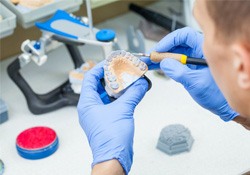
It’s natural to have questions about any type of dental restoration—after all, it’s going to be a new addition to your smile for the foreseeable future! That said, if you’re slated to receive dentures, you might have questions about what the process for creating and getting them looks like. Continue reading below to learn a little more about how dentures are made and how you can begin adjusting to your new smile.
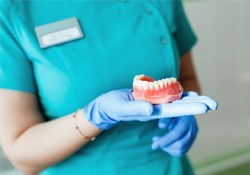
Here’s a closer look at the two main parts that typically compose dentures: the base, and the artificial teeth.
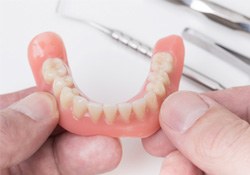
Each denture is custom-made for the patient’s mouth, meaning that the overall process of getting dentures consists of multiple stages. First, we’ll need to take impressions of your upper and lower gums to create a perfect replica of your mouth. This model is used to ensure that your final restoration is the correct size and shape. Measurements of the jaw are also taken; every little bit of information gathered helps the process go smoothly!
The model is usually sent to a dental laboratory where the dentures are fabricated. Skilled technicians will create a wax version of your gumline and begin appropriating the replacement teeth to it. This involves a mechanical device called an articulator, which attaches the teeth to the wax base in a natural-looking pattern. The wax base is sent back to us so we can ensure that things look good, and then we’ll send it back to the lab for the rest of the construction process.
Next, the dentures are placed in a flask that’s filled with plaster to hold their shape, and then the flask is placed in hot water to boil away the wax portions from the dentures. Holes are drilled into the artificial teeth and acrylic is injected into the flask to replace the wax. The plaster is carefully removed, and excess acrylic material is removed before the denture is polished to perfection.
Finally, the denture is returned to us for any last-minute adjustments. Once we’ve confirmed that everything looks and functions as intended, you’re sent off into the world with your newly complete and fully functional smile!

Many patients feel slight discomfort upon receiving their dentures, but fortunately, this is only temporary. It’s important to give yourself time to adjust to your new smile—you’ll want to keep up with exercising your facial muscles, practicing your conversing, and of course, sticking to a soft food diet. In time, your mouth will gradually become comfortable with the prosthetic teeth, and you’ll hardly notice a difference in how they look and feel! If your discomfort persists and you’re concerned about your mouth’s lack of adjustment, don’t hesitate to call us for assistance!

Whether you’re missing one or more teeth, having gaps in your smile can make it hard to perform everyday tasks like eating and talking. Tooth loss doesn’t just affect your speech and diet – it can negatively impact your self-esteem as well. Fortunately, restoring your smile with dentures in Green Hills will allow you to enjoy a fully functioning grin once again. Below, you can learn more about the incredible benefits of this method of tooth replacement.

As you can imagine, tooth loss can have a significant impact on your self-confidence and overall quality of life. People with missing teeth are more likely to experience an increased risk of social anxiety, sadness, and even depression. Replacing the gaps in your smile with dentures will help you avoid worrying about the way you look when you talk or laugh. You’ll be able to engage confidently in social activities!

When you’re missing teeth, it can be very difficult to pronounce and enunciate certain words. That’s largely because your lips and tongue interact with them to perform the proper speech. If you suffer from tooth loss, you will have a hard time communicating with one effectively. Because dentures restore your entire smile, they make it easier for you to speak with ease! After some practice, you’ll be speaking fluently and confidently.

Believe it or not, tooth loss can affect your diet as well. You may not be able to chew foods like before, causing you to experience problems like indigestion and malnutrition. Completing your smile with dentures will restore your chewing power, allowing you to expand your diet to more nutritious options. You’ll be able to get the essential nutrients you need for optimal health!

If you have any remaining healthy teeth, they may start to shift to fill in the gap left by a tooth. Failing to replace this gap can lead to further tooth loss and jawbone resorption. These complications can be avoided with dentures, which can help support the natural teeth that are left. Plus, your restorations can withstand more of the pressure of chewing, which can help you avoid further wear and tear on your remaining smile.

Your smile is one of the first things people notice during job interviews, social gatherings, and first dates. According to a 2019 study, poor oral health is associated with a lower probability of being employed. For that reason alone, it’s worth the effort to complete your smile with dentures. These prosthetics will significantly improve your oral health and career opportunities in the long run!

True enough, dentures can transform your smile’s appearance and function. They wouldn’t make good tooth restorations otherwise. However, these prosthetics only work when given proper care. In fact, they’ll actually cause problems if they aren’t well-maintained. Given these facts, Green Hills Dental Center is here to help: listed below are some helpful tips on caring for dentures. By reading them over, you can ensure your new smile stays effective for the long haul.
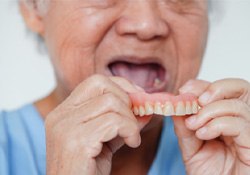
First, you ought to remove and rinse your dentures after every meal. This habit keeps them from accumulating food debris and plaque. As a result, you’ll reduce your risk of oral issues.
During these rinses, though, don’t use hot water. High temperatures can (and often will) warp denture material. A steaming rinse, therefore, might cause your dentures to fit improperly.
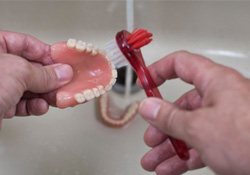
Another suggested practice is once-daily denture cleanings. Done well, these sessions eliminate harmful bacteria that cling to your prosthetic teeth.
Denture cleaning should be a fairly simple task. Usually, all it takes is a soft-bristled toothbrush and hand or dish soap. Regular toothpaste, meanwhile, should be avoided – its abrasiveness can damage dentures.
If possible, conclude this brushing step by soaking your dentures in a cleaning solution. You can then rinse the restorations before putting them back in your mouth.
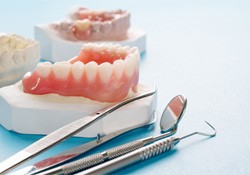
Dentures aren’t invincible; they can be broken with enough force. While you can rely on them to eat, therefore, you’ll need to keep them safe when they’re not in use.
Luckily, there are various ways to protect dentures. One is to use a towel during the daily cleanings, as cloth could protect your restorations from falls. Another example is to store your dentures away from kids or pets. If you don’t, these groups could break your new teeth through roughhousing.
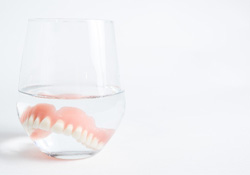
Before bed each night, make sure to remove your dentures. You can even store them in a soaking solution while you sleep. By doing so, you’ll protect your mouth from harm.
This instruction stems from how denture overuse is bad for your health. It restricts gum circulation, for one thing, resulting in soft-tissue irritation. Wearing dentures overnight also increases your plaque levels and raises your risk of pneumonia.

For as long as you wear dentures, watch for changes in them and your mouth. These shifts may need professional care from your local dental practice. If you notice any, see your dentist immediately.
For example, visit your dentist if your dentures suddenly fit poorly or get damaged. Attempting your own fix could worsen the situation. In contrast, a qualified dentist can refit or replace the prosthetics.
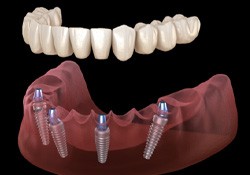
Being different from removable ones, All-on-4 dentures have their own care steps. These include:

If you’re struggling with extensive tooth loss, then dentures may be the ideal solution for you. With these durable and custom-made restorations, you’ll be able to renew your missing pearly whites and enjoy your full smile again! However, you may be wondering about what to expect from the overall cost of the entire treatment. And just as every patient’s dental situation is different, the prices will also vary significantly from person to person. Our team at Green Hills Dental Center will first assess your oral health, provide you with a price estimate, and then walk you through your financing options to make your treatment more manageable. Read on to learn more about the cost of dentures in Green Hills!

Here are several factors that can influence the overall price of your dentures:
Although it may seem tempting or convenient to opt for lower-priced dentures, this may not be the best way to save on your out-of-pocket expenses. By choosing “more affordable” prosthetics, you’ll typically expect much cheaper materials to be used, meaning your restorations can be easily damaged and may need replacements prematurely. To avoid these complications, you should aim for quality, which will save you money in the long run.

Since implant dentures involve a minor oral surgery and placement procedure, they are generally more expensive than traditional ones. While the treatment is more invasive and has a higher price value, it does come with numerous benefits you won’t find with regular dentures. For example, they won’t shift out of place while eating, as they’ll be directly anchored to your jawbone. Furthermore, they’ll help stimulate your jawbone, providing increased biting strength and stability. This can make your treatment a worthwhile investment, especially since your new pearly whites will be able to last several decades to a lifetime!

Most dental insurance companies will offer coverage for some of the costs of your dentures, as they are considered a major restorative treatment. That said, every policy is different, so you’ll need to double-check the details of your plan with your provider to make sure you can make the most out of your benefits. You can also speak with our knowledgeable dental staff, and we’ll be glad to help you navigate your policy if necessary.

Don’t have dental insurance? That’s fine! We understand that not everyone is covered, which is why we are proud to provide alternative financing options to help with the cost of dentures. Our team offers an in-house membership club plan that can give you a 20% discount on all treatments, including dentures. We also work with Lending Club and CareCredit—both of which offer plans that can break up the cost of your treatment into smaller monthly installments. Many of their options also come with little to no interest, providing a stress-free experience when affording the necessary treatment to restore your smile!

If you’re missing several, most of, or all of your pearly whites, then dentures can be a life-changing solution for your smile. That said, it’s normal to want to be well-informed about your treatment before committing to anything. For this reason, our team at Green Hills Dental Center has compiled and responded to several of the most frequently asked questions about this reliable tooth replacement option. Read on to learn more about dentures in Green Hills or schedule your initial consultation today. Give us a call if you don’t see the information you’re looking for!
You’re most likely to experience some form of discomfort if you require tooth extractions before getting dentures. However, you can easily manage any minor pain by taking over-the-counter and prescribed pain relievers as instructed. Once you begin wearing your dentures, there may be some mild irritation in your mouth (especially your gumline) as you start growing accustomed to your new teeth. This can also occur if you’re switching to a new set of dentures, but the length of the adjustment process will vary from patient to patient. If any discomfort persists or worsens over time, be sure to inform us so that we can make any necessary changes for a proper fit or address any underlying issues.
When first wearing your dentures, it may take some time to adjust to speaking with them since you’ve been accustomed to talking with your natural teeth. This may also be due to muscle memory as your tongue will need to get used to the presence of your prosthetic pearly whites. While the adjustment period for speaking with dentures is unique to every patient, constant practice can generally speed up the process. Make sure to pronounce words, sounds, and phrases repeatedly and read aloud to yourself. You’ll also want to speak slowly at first, as quicker speech can often come out muffled if you’re not used to your dentures yet.
Most dentists highly recommend that you remove your dentures before going to bed. Although you may be instructed to wear them for the first 24 hours after receiving them, you’ll want to take them out overnight after that. By keeping them on, you can end up restricting blood circulation in your gums, which can result in soft tissue irritation and even speed up ridge resorption. If you take them out before bed, you’ll give your gums a chance to recover and receive essential nutrients as you sleep. This will also help prevent bacteria from growing in your mouth or on your dentures, as dark and moist areas are the perfect environment for them to grow. Be sure to soak your restorations in a glass of water overnight to keep them fresh and germ-free!
Tougher meats such as steaks can be challenging to chew with dentures. That said, you might still enjoy these foods if you take the proper precautions. Try sticking to steaks that don’t contain so many fibers or connective tissues, such as tenderloin. Make sure the meat is completely tenderized and that you cut it into tiny, more manageable pieces. This way you can enjoy your meal while avoiding the need to chew frequently.
Repairing a damaged tooth when possible is always preferable to replacing it. Tooth extractions of any kind are only ever recommended when absolutely necessary, like when a tooth is damaged beyond repair. If all of the teeth in an arch are severely decayed or infected with gum disease, replacing them with dentures may be more cost-effective, but your dentist will explore all over options before recommending extractions for dentures.
Bacteria can become trapped in your dentures, especially if they are no longer fitting properly. Ill-fitting dentures can also irritate the soft tissues of the mouth, possibly leading to sores and infections. Another reason for bad breath is the fact that denture wearers tend to produce less saliva, causing dry mouth. Dry mouth allows harmful bacteria to thrive and worsens bad breath. Fortunately, you can prevent bad breath by cleaning your dentures every day with a soft-bristled toothbrush and specialized cleaner. Also be sure to brush your gums, tongue, cheeks, and palate to keep your mouth fresh. Soak your dentures in a disinfecting solution every night to keep them moist and rid them of bacteria. You should also give your dentures a thorough rinse after each meal.
When you lose your teeth, your facial muscles will begin to sag. This can give your face a sunken appearance. Getting dentures will mean providing support to the facial muscles that have collapsed, therefore improving your appearance. If your dentures are not fitting properly, they may not give your facial muscles proper support, so you should have yours refitted or relined as soon as you realize it isn’t fitting properly.
Contrary to popular belief, it is very possible to kiss with dentures. However, it does take time to get used to. Dentures don’t have nerves like real teeth do, so you should be especially careful not to accidentally put too much pressure against your partner. Remember to be especially gentle when kissing with dentures so your smile doesn’t shift out of place.